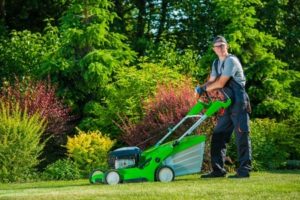
As the final vestiges of winter fade away, homeowners and professional landscapers begin to compile the annual list of things to prepare for the new growing season. Raking away debris and leaves that may have remained after the winter, servicing equipment, and clearing gardens are some of the routine operations needed in order to get ready for the glorious renewal of spring.
Home and business owners anticipate the arrival of their landscape professionals to begin the operations to restore the landscape to its natural beauty.
Fertilizing in the Spring
When and how lawns should be fertilized is an ongoing question that landscapers and professionals debate. As for the question of when to feed, most believe that fertilizing should occur in late spring to allow the grass to develop stronger roots first before adding nutrients to grow the leaf. May or early June works well in many areas as the grass begins to grow and will need the additional nitrogen stores to weather the sweltering months of summer.
If you had applied a light coating of fertilizer in the fall before the first frost appeared, that product should be sufficient to sustain the lawn until late spring.
Fertilizing in the spring with products that include additives to prevent weed development and reduce the presence of insects can also lessen the work required later to maintain a beautiful and healthy lawn.
Organic or Non-Organic
As for what to use, the debate centers around the question of chemical vs. organic fertilizers. The chemical products do yield bright green and fast-growing grass while using sparingly reduces environmental impacts. Over fertilizing is never necessary, and many believe that only half of the commercial recommendation is needed. Professional landscapers use the minimum amount of chemical fertilizers necessary to create the best results.
The Organic Approach
Organic, chemical-free fertilizers are available, popular, and do a good job. These contain the necessary ratios of nitrogen, phosphorus, and potassium for healthy lawns, usually in lesser amounts than non-organic fertilizers.
Also, using mulching mowers will chop the grass into tiny sections which will act as a natural self-fertilizer throughout the growing season.
Heritage Oak Farm
Professional landscapers and nurseries use Heritage Oak Farm’s ProLine™ equipment for transporting and handling trees and large plants.
To learn more and to find answers to these pressing problems, phone the experts at Heritage Oak Farm at 888.288.5308.
